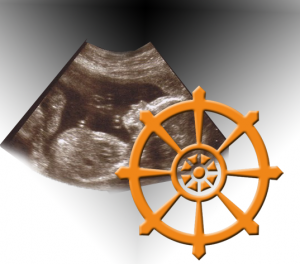 Do Fetuses Feel Pain?
Do Fetuses Feel Pain?
Ed. There is real pain and real irony in this post from Tom Bartlett,. He discusses the nationwide effort to ban abortioins after 20 weeks because, the radical right claims, a fetus at that point mean feels pain. The lack of development of the frontal cortex makes it unlikely that anything, or anybody, exists at 2o weeks to “feel” anything. The irony here is that the Christian radicals may not understand that the the Buddha. The Buddha’s message is based on a simple statement … humans suffer. Feeling pain is a form of suffering. Can a 20 week fetus suffer?
June 28, 2011, 2:25 pm
By Tom Bartlett
The Alabama state legislature recently passed a ban on abortions after 20 weeks, except when the mother’s health is in danger. Why 20 weeks? A Republican state senator explains: “It’s clear that a baby at 20 weeks experiences pain. There’s no doubt about that.”
In reporting on the recent ban, which follows similar bans in several other states, an article in The New York Times contends that the argument that fetuses can feel pain at 20 weeks is “disputed by mainstream medical organizations in the United States and Britain.” It goes on to assert that supporters of these bans make such claims “in the face of scientific criticism.”
So on one side we have politicians, while on the other we have Science. I’m guessing a lot of New York Times readers sadly shook their heads at the triumph of blatant propaganda over peer-reviewed evidence.
Which would be an understandable reaction — but only if you knew nothing about the very real, continuing debate regarding fetal pain.
Let’s start with the assertion by the Alabama state legislator, whose name is Scott Beason. He said that “there’s no doubt” that fetuses at 20 weeks experience pain. That’s not true. There is quite a bit of doubt about that among researchers. To say otherwise you have to be uninformed or dishonest.
But it’s also misleading to portray the debate as one between credentialed scientists and know-nothing activists. Here’s an example: the article mentions a report by the Royal College of Obstetricians and Gynecologists in Britain, published last year, which says that “pain is not possible until after 24 weeks” because, prior to that time, fetuses lack the necessary cortical connections.
Seems pretty definitive. That report, however, has been criticized by scientists like Martin Ward Platt, an honorary clinical reader in neonatal and pediatric medicine at Newcastle University and chairman of a committee that studies pain in children. In an editorial published in Fetal and Neonatal, Platt mocks the report as “an emperor with no clothes” that employs “wishful thinking for empirical enquiry.”
Specifically, Platt writes that the report presents “no evidence for the contention that human fetuses lack awareness” and argues that fetal hearing, sleeping and waking, and memory, suggest otherwise. While it’s true, he writes, that fetuses at 20 weeks lack a cortex, that doesn’t mean stress and pain can’t be experienced in other ways.
That’s essentially what Sunny Anand, a professor of pediatrics at the University of Arkansas, has attempted to prove in multiple papers. In one of those papers, he wrote that “Whereas evidence for conscious pain perception is indirect, evidence for the subconscious incorporation of pain into neurological development and plasticity is incontrovertible.” In slightly plainer English, Anand wrote in the London Times that research has shown that the cortex is “not essential” for pain in adults, and therefore it shouldn’t be the standard for fetuses.
The New York Times article does concede that “a handful” of scientists think fetuses can feel pain even without a cortex. But it doesn’t name them or offer any of their arguments. Instead, it links to a website created by anti-abortion activists, again reinforcing the (inaccurate) conclusion that activists are on one side and scientists are on the other. The dismissive “handful” is nice, too.
What any of this has to do with abortion is unclear. Neither Platt nor Anand argue for abortion restrictions (in fact, Platt states that he favors Britain’s current law, which permits abortions up to 24 weeks). The topic of fetal pain is usually raised when doctors and researchers discuss whether to provide anesthesia during fetal surgery. Cherry-picking research to gin up support for new anti-abortion laws is lame and manipulative.
But so is pretending like there’s no debate.